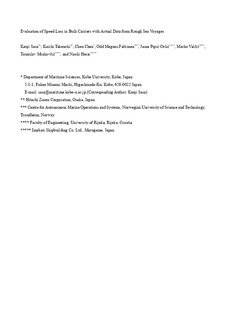| dc.contributor.author | Sasa, Kenji | |
| dc.contributor.author | Takeuchi, Kaichi | |
| dc.contributor.author | Chen, Chen | |
| dc.contributor.author | Faltinsen, Odd Magnus | |
| dc.contributor.author | Prpic-Orsic, Jasna | |
| dc.contributor.author | Valcic, Marko | |
| dc.contributor.author | Mrakovcic, T. | |
| dc.contributor.author | Herai, Naoki | |
| dc.date.accessioned | 2020-01-10T11:41:29Z | |
| dc.date.available | 2020-01-10T11:41:29Z | |
| dc.date.created | 2019-08-28T09:29:44Z | |
| dc.date.issued | 2019 | |
| dc.identifier.citation | Ocean Engineering. 2019, 187 1-19. | nb_NO |
| dc.identifier.issn | 0029-8018 | |
| dc.identifier.uri | http://hdl.handle.net/11250/2635676 | |
| dc.description.abstract | The evaluation of speed loss is the most important studies in the optimal ship routing. However, the mode of speed loss during rough sea voyages is complicated because of the involvement of the human factor. A speed loss analysis is conducted to improve the accuracy of evaluation of measured data extracted from actual marine conditions. First, the conventional criteria to judge the deliberate speed reduction is summarized with the conventional ship maneuvering techniques. Second, a nationwide questionnaire for marine engineers implemented for engine safety during rough sea voyages is detailed. Third, these conventional criteria are validated by analyzing the collated data on accelerations, ship motions, navigation, and engine parameters. The limiting value of vertical acceleration agrees with that obtained via practical measurements. On the contrary, the limiting values of lateral acceleration, roll motions, probabilities of deck wetness, and slamming do not agree with that obtained via measurements. The probabilities of deck wetness, slamming, and propeller racing start to increase at approximately the same instant where the deliberate speed reduction occurs. Some relations between the deck and engine parameters detailed in this paper were found to be highly correlated. Finally, the results of the analysis were used to model simpler estimations. | nb_NO |
| dc.language.iso | eng | nb_NO |
| dc.publisher | Elsevier | nb_NO |
| dc.rights | Attribution-NonCommercial-NoDerivatives 4.0 Internasjonal | * |
| dc.rights.uri | http://creativecommons.org/licenses/by-nc-nd/4.0/deed.no | * |
| dc.title | Evaluation of speed loss in bulk carriers with actual data from rough sea voyages | nb_NO |
| dc.type | Journal article | nb_NO |
| dc.type | Peer reviewed | nb_NO |
| dc.description.version | acceptedVersion | nb_NO |
| dc.source.pagenumber | 1-19 | nb_NO |
| dc.source.volume | 187 | nb_NO |
| dc.source.journal | Ocean Engineering | nb_NO |
| dc.identifier.doi | 10.1016/j.oceaneng.2019.106162 | |
| dc.identifier.cristin | 1719367 | |
| dc.description.localcode | © 2019. This is the authors’ accepted and refereed manuscript to the article. Locked until 10.7.2021 due to copyright restrictions. This manuscript version is made available under the CC-BY-NC-ND 4.0 license http://creativecommons.org/licenses/by-nc-nd/4.0/ | nb_NO |
| cristin.unitcode | 194,64,20,0 | |
| cristin.unitname | Institutt for marin teknikk | |
| cristin.ispublished | true | |
| cristin.fulltext | postprint | |
| cristin.qualitycode | 1 | |

